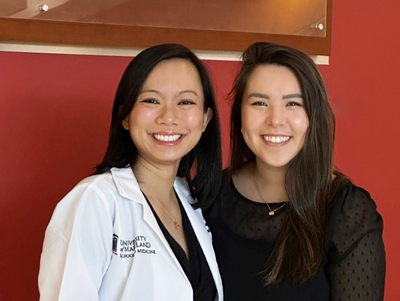 Coping with the many different aspects of a brain cancer diagnosis is challenging. The physical and emotional toll on patients is monumental, and it takes a special, compassionate team of health-care caregivers to treat not only the disease, but the individual. Lily Pham, MD, and Sarah Wessling, BSN, RN, at the University of Maryland Greenebaum Comprehensive Cancer Center, are being recognized for being that kind of team.
Coping with the many different aspects of a brain cancer diagnosis is challenging. The physical and emotional toll on patients is monumental, and it takes a special, compassionate team of health-care caregivers to treat not only the disease, but the individual. Lily Pham, MD, and Sarah Wessling, BSN, RN, at the University of Maryland Greenebaum Comprehensive Cancer Center, are being recognized for being that kind of team.
When you meet Dr. Pham and Sarah, you would never guess that they have only worked together since November. In that short time, they have developed a professional relationship that elevates patient care and exudes an energy of trust and comfort that patients find contagious. Their commitment to their patients, each other, and the field of oncology runs deep.
Often when people learn that the duo works in oncology, they focus on the sadness and fail to see the big picture. It’s not that Dr. Pham and Sarah minimize the seriousness; they just measure success in many different ways. “Brain Cancer sucks; there's no way of sugarcoating or making it sound nice,” Dr. Pham affirms. “It’s a very tough disease to cope with, and it certainly brings up the question of mortality. We’re making a difference in someone's life, whether it's helping someone survive a nasty cancer diagnosis, or—in certain cases—helping our patients pass with dignity.”
Sarah echoes Dr. Pham’s sentiments. “There are very sad aspects to oncology, but getting our patients through each day—helping our patients feel like ‘we're going to keep moving forward, we're going to get through this together’—that is so rewarding,” she shared. “I've been in other areas of nursing, and I haven't loved it quite as much as I've loved oncology. Often when we meet our patients, it's the most hopeless they've ever felt; it is nice to be able to give rays of hope, time and little victories along the way.” Those types of triumphs and the relationships they develop with their patients and their patients’ families are what fulfill them.
Patients interface with Sarah daily as she coordinates their care, and educates and monitors them in and out of the hospital, while Dr. Pham interacts with them during appointments. “Sarah is literally the infrastructure,” Dr. Pham said. “They know that she is an integral part of this team and that they can trust her as much as they trust the medical system or their oncologist. We’re all in this together.”
From the onset, it was clear to each of them that they would work incredibly well together due to their similar approach to patients and life in general. Sarah’s initiative amazed Dr. Pham. “She anticipates the needs of our patients. I came from a system where our RNs didn't have that much leeway. It made me feel very safe in our patient care.”
The diligence with which they approach their work is noteworthy. Sarah acknowledges she scrutinizes her patients’ charts in effort to keep Dr. Pham up to date often to learn that Dr. Pham had already reviewed them, while Dr. Pham frequently makes a request only to find out that Sarah has already taken care of it.
“I want to know if things look off, and I want Dr. Pham to be aware as soon as possible,” Sarah explained. “We communicate really well, and we keep each other posted on updates.” Dr. Pham jokes that she texts Sarah more than she does her husband.
Patients treasure their attentiveness and responsiveness as they strive to acclimate a new normal. “The fact that they can always trust that Sarah and I are there for them as a team helps them feel more secure and regain some type of normalcy in their lives,” Dr. Pham said. “They can reach out to us whenever there are concerns.”
Their rapport with each other and their patients extends to their patients’ families. When the brain is impacted, patients often can’t reach out themselves when there’s a problem or questions so it is really a family and community effort, the team explained. “We always try to establish a patient’s support system and how we can pull their support system into everything we do,” Dr. Pham added.
Dr. Pham and Sarah exhibit much more than the science of medicine at its best; they have perfected the art as well. “Our patients willingly let us as a team into every aspect of their lives,” Dr. Pham continued. “We feel privileged to work with our group of patients. Each day that we see them, it is a day at work for us,” she added. “But it could be the worst day of their lives. They know that we’re going to be there for them for the good days and the bad days.”
We invite you to recognize a special caregiver in your life by making a gift in their honor.
With your gift, you can include a personal note to share your gratitude.
To learn more about our Honor a Caregiver program, visit ummsfoundation.org/honoracaregiver.